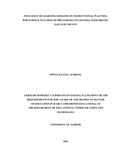| dc.contributor.author | Achieng, Juliana, O | |
| dc.date.accessioned | 2017-01-10T08:15:50Z | |
| dc.date.available | 2017-01-10T08:15:50Z | |
| dc.date.issued | 2016 | |
| dc.identifier.uri | http://hdl.handle.net/11295/100131 | |
| dc.description.abstract | Designing the full spectrum of cognitive, psychomotor and affective instructional objectives presupposes the availability of adequate resources and teachers who are competent. In resource scarce settings such as Kisumu Municipality, constrains abound in the formation of such comprehensive instructional objectives. Early Childhood Education has not been mainstreamed into the education sector fully leading to challenges in oversight and reference standard for teachers’ involvement in elaborate instructional planning processes. This study aimed at investigating the influence of the cognitive, psychomotor and affective learning domains in instructional planning in pre-schools in Central Zone in Kisumu East Sub-County. Descriptive survey method using stratified and simple random sampling was used to sample respondents. The target population for this study included 17 teachers from public and 23 teachers from private pre-schools. Sample size of the study was 126 Pre-school teachers from whom 40 participants were sampled for actual involvement in the study. Questionnaire and observation checklist was developed by examining the research objectives, research questions and reviewed literature. A test re-test technique or coefficient of stability method was used to establish the degree to which the same result could be obtained with a repeated measure and accuracy. The study established that majority of teachers 37(92.5%) include cognitive learning outcomes when planning for science in pre-schools. Similarly majority also agreed they include psychomotor learning outcomes 39(97%) and also affective learning outcomes 33(82.5%) when planning for pre-schools science instructions. However respondents found it challenging to plan for belief and attitude change learning outcomes. The study also noted that teachers with advanced training tended to be more likely to including learning domains in their instructional plans. Therefore learning domains play a prominent role in instructional planning in pre-school in the study area. The study recommends that pre-school teachers should be trained and provided with pre-school science activities guides so that they can involve children in conducting their own investigations in science activities in the three domains of learning | en_US |
| dc.language.iso | en | en_US |
| dc.publisher | University of Nairobi | en_US |
| dc.rights | Attribution-NonCommercial-NoDerivs 3.0 United States | * |
| dc.rights.uri | http://creativecommons.org/licenses/by-nc-nd/3.0/us/ | * |
| dc.subject | Influence of Learning Domains on Instructional Planning for Science Teaching | en_US |
| dc.title | Influence of Learning Domains on Instructional Planning for Science Teaching in Pre-schools in Central Zone Kisumu East Sub County | en_US |
| dc.type | Thesis | en_US |



